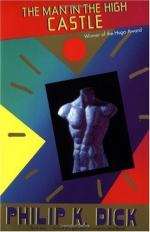
|
| Name: _________________________ | Period: ___________________ |
This test consists of 5 multiple choice questions, 5 short answer questions, and 10 short essay questions.
Multiple Choice Questions
1. In Chapter 7, how do Paul and Betty react to Childan's comments about Abendsen's theories?
(a) They report him to the officials.
(b) They worry he will be persecuted.
(c) They realize they have an ally.
(d) They voice their disagreement.
2. What does the I Ching tell Juliana when she consults it for advice?
(a) To warn Abendsen.
(b) To notify the police.
(c) To return to Colorado.
(d) To call Frank.
3. Because he feels The Grasshopper Lies Heavy is a dangerous book, what does Reiss think should happen to its author?
(a) He should be quietly arrested.
(b) He should be humiliated in public.
(c) He should be exposed as a liar.
(d) He should be secretly assassinated.
4. Toward the end of Chapter 12, what does Tagomi realize about Reiss and vom Meere?
(a) They are responsible for the surprise attack.
(b) They are eager to help him out.
(c) They are behind Ramsey's defection.
(d) They are working undercover for Japan.
5. Why does Wegener give the cigarette case to Tedeki?
(a) It is to be used to signal success.
(b) It symbolizes the union of Germany and Japan.
(c) It contains proof of his message.
(d) It exemplifies the latest in scientific invention.
Short Answer Questions
1. In Chapter 12, what happens while Tagomi and his visitors meet in his office?
2. As Chapter 10 closes, how does Tagomi's message from the I Ching come true?
3. What does Tagomi's experience in the all white diner and the discovery that he left his belongings in the park make him realize he must do?
4. What are Americans portrayed as doing by the author of The Grasshopper Lies Heavy that impresses Juliana?
5. As he sits in his office, engrossed in reading The Grasshopper Lies Heavy, what does Reiss suggest is the "power of fiction" ?
Short Essay Questions
1. When the police approach Frank and arrest him, Frank thinks, "This is what the times require of us." What does this quote mean? What is the real reason Frank is being arrested? How does this arrest in this society reflect the quote?
2. Frank thinks Juliana may be able to help him and McCarthy sell their jewelry. He looks at this relationship as being strictly business. What qualities does he see in her that could be helpful? What does this further reveal about her character? Do you feel this is the real reason he would like to contact her?
3. Why is Tagomi shocked when the elderly man shows up for the meeting with Baynes? What concerns does Tagomi share with him? What is the visitor's reaction to these concerns?
4. Paul's proposal to mass market the Edfrank Jewelry is turned down by Childan, despite the fact this could have made him very wealthy. What has the jewelry come to symbolize to Childan that makes it more important than wealth? How does this realization affect him?
5. Chapter 10 focuses on the internal and external conflicts faced by Baynes. What are these conflicts? What do they suggest about his character?
6. In Chapter 8, Reiss receives two messages about individuals who have come into the PSA. What does he learn? What can we assume as a result?
7. In Chapter 8, upon entering the Kasoura neighborhood, Childan thinks to himself, "I do not belong here." In what way is this statement true? What does the author draw upon from actual history to depict this scene?
8. Juliana's words and thoughts seem jumbled and senseless at one point in Chapter 13 as she says things like, " Hair creates bear who removes spots in nakedness." and "However, only woman." What is the cause of this gibberish and disorientation? Do you feel this type of dialogue enhances or distracts from the storyline? Why?
9. As Childan reflects on how his beliefs have been shaken, he pities himself as being a salesman who has to deal with people like Tagomi, who, in his words, "by merest reflection manage to rub my nose in it, make my life miserable." In what way does this statement take an ironic twist in light of how he treats McCarthy and makes plans for Edfrank Jewelry?
10. As Juliana continues to read The Grasshopper Lies Heavy, the reader learns more of its contents. What are some ways Abendsen has changed the history of his world? What do Juliana's and Joe's reactions to these changes say about each of them?
|
This section contains 1,535 words (approx. 6 pages at 300 words per page) |

|




